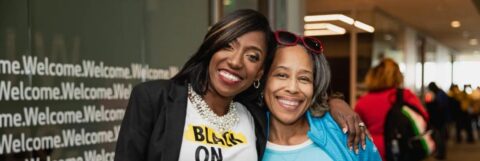BridgeDetroit
Orlando Bailey
March 13, 2024
The Metro Detroit Black Business Alliance is changing its name and expanding membership to Lansing and Flint thanks to a recent $500,000 appropriation from the state legislature.
The three-year-old organization, which delivers technical assistance, provides links to low-cost capital and finds space for entrepreneurs to connect and collaborate, will now be called the Michigan Black Business Alliance. The alliance already has more than 1,500 members in the Metro Detroit area.
Charity Dean, president of MBBA, says the organization was founded on the premise of closing the racial wealth gap and getting capital resources to entrepreneurs who need it most.
“Our unique programs and bold policy advocacy have helped decision-makers begin to approach small businesses as essential drivers of economic development,” Dean told BridgeDetroit.
“We’ve started that change in Detroit. We will continue the change in Detroit. Now we’re going to do it across the state.”
MBBA will begin piloting programs in Lansing and Flint this summer. BridgeDetroit spoke with Dean ahead of MBBA’s annual State of the Black Business luncheon about the new appropriation and expansion.
Editor’s note: This transcript was lightly edited for length and clarity.
BridgeDetroit: How did the allocation from the legislature happen and how long were you working on this?
Dean: So it happened by meeting with folks about the work that we’re doing, but specifically Senator (Sarah) Anthony who is a state appropriations chair. We talked about our Capital Connect and our BizWiz program and she, being from Lansing, said she would love to see us pilot some of these programs in other areas beyond Metro Detroit.
BridgeDetroit: Can you talk about changing the name to Michigan Black Business Alliance and what that means for the organization?
Dean: There’s a duality here, because the work is not done in Metro Detroit. We’ve seen nationally that there’s been growth for Black businesses in the last three years. And that’s due to the intentionality of using American Rescue Plan Act funding from the Biden administration, but also organizations like ours being very intentional in doing the work, and there’s still so much work to be done. We are also excited because we get people who say, “Hey, can y’all come here and do this?” because what we do is so unique and rare. Especially our Capital Connect program. With our growth comes more responsibility.
BridgeDetroit: Talk about the Capital Connect program.
Dean: So our Capital Connect program is unique for a number of reasons. First off, we require funders to give us their underwriting guidelines – unheard of. And the reason we require that is because we know that there can be a lot of bias in small business lending. And when you understand what the rules are, you can prepare people to be matched to funders where the criteria fit., It really is a win-win situation. We help funders connect our members and then it’s a hand-holding process. So we’re in our ninth and 10th cohort that we’re running consecutively because the demand for the program is so large. We train entrepreneurs on business plans, developing financial projections for three years, and pitch development. After that, we reach out to potential funders on their behalf. We’ve been doing that since we started the program in August 2021. And Black businesses have gotten over $5 million in small business lending. We pushed banks to participate and this year, Huntington was one of our first banks to sign on.
BridgeDetroit: How does that $5 million get broken down?
Dean: Our average deal is probably about $50,000 or so. But we’ve had some really big ones and we’ve had some small ones. We only have about 20 to 25 folks in each cohort. So our main goal is that they have everything they need to get funded with a fully fundable package. So we are literally looking for the barriers and eliminating them.
BridgeDetroit: What will be the strategy for Lansing and Flint?
Dean: So part of our model is to go and understand what the needs are. We’re not going to just go and assume we know. We’re going to work with people that are already doing the work, and then figure out how we can supplement the work. We’ll also engage on the policy side.
BridgeDetroit: Talk about the current membership base. What does it look like?
Dean: We’ve got about 1,500 members; 70% of our members are Black women. There’s an economic imperative to the work that we do. But a lot of times we allow our fear of race to impede our economic growth in our state and our country. A report from Brookings talked about Black business growth and within the sectors that we controlled, we outperformed non-Black businesses in revenue and employment. I think in a state like Michigan, it’s important to double down on the programs that we have because everybody is helped when you are doing the work of equity. When we do our work and challenge the way government operates, every single small business owner wins. When banks publish their underwriting guidelines publicly, everybody wins. We’re building out a Black provider network so that we have Black businesses helping other Black businesses. We think that that matters: 78% of MBBA’s budget went to Black businesses last year; 97% of those businesses were our members. We have built out an ecosystem of providers that include lawyers, accountants, marketing professionals, etcetera that support small businesses and pay them to service our members.

